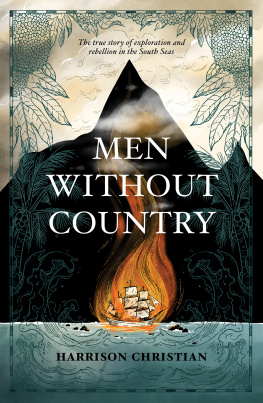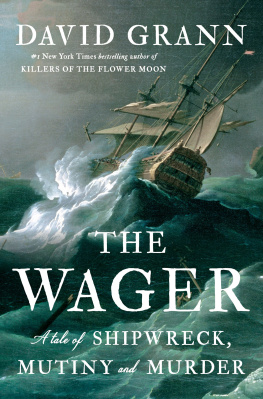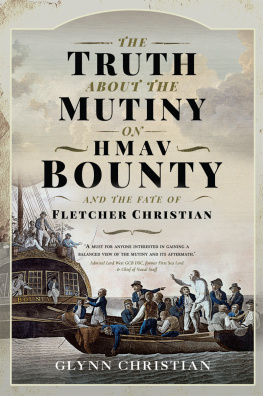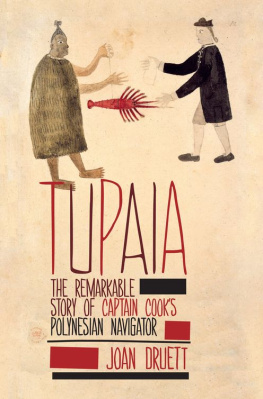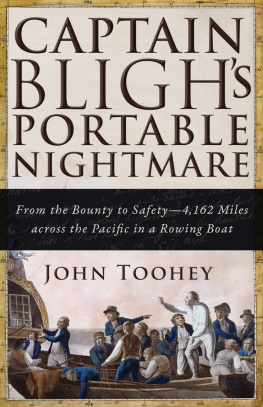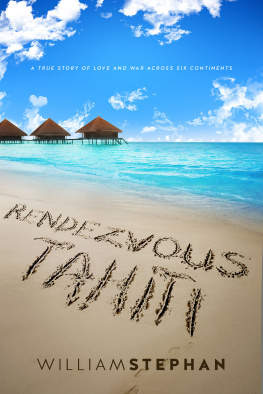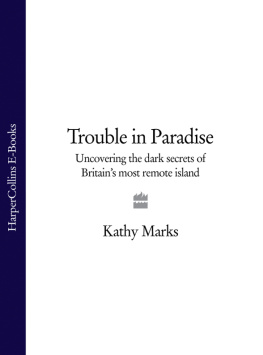Harrison Christian - Men Without Country: The true story of exploration and rebellion in the South Seas
Here you can read online Harrison Christian - Men Without Country: The true story of exploration and rebellion in the South Seas full text of the book (entire story) in english for free. Download pdf and epub, get meaning, cover and reviews about this ebook. year: 2021, publisher: Ultimo Press, genre: Adventure. Description of the work, (preface) as well as reviews are available. Best literature library LitArk.com created for fans of good reading and offers a wide selection of genres:
Romance novel
Science fiction
Adventure
Detective
Science
History
Home and family
Prose
Art
Politics
Computer
Non-fiction
Religion
Business
Children
Humor
Choose a favorite category and find really read worthwhile books. Enjoy immersion in the world of imagination, feel the emotions of the characters or learn something new for yourself, make an fascinating discovery.
- Book:Men Without Country: The true story of exploration and rebellion in the South Seas
- Author:
- Publisher:Ultimo Press
- Genre:
- Year:2021
- Rating:3 / 5
- Favourites:Add to favourites
- Your mark:
Men Without Country: The true story of exploration and rebellion in the South Seas: summary, description and annotation
We offer to read an annotation, description, summary or preface (depends on what the author of the book "Men Without Country: The true story of exploration and rebellion in the South Seas" wrote himself). If you haven't found the necessary information about the book — write in the comments, we will try to find it.
What joy to be at sea again, adrift on the vast Pacific, in the clutches of a gifted storyteller. Harrison Christian and the mutineers of Men Without Country held me happily captive to the very last page. Dava Sobel, author of Longitude
A mission to collect breadfruit from Tahiti becomes the most famous mutiny in history when the crew rise up against Captain William Bligh, with accusations of food restrictions and unfair punishments.
Blighs remarkable journey back to safety is well documented, but the fates of the mutinous men remain shrouded in mystery. Some settled in Tahiti only to face capture and court martial, others sailed on to form a secret colony on Pitcairn Island, the most remote inhabited island on earth, avoiding detection for twenty years. When an American captain stumbled across the island in 1808, only one of the Bounty mutineers was left alive.
Told by a direct descendant of Fletcher Christian, Men Without Country details the journey of the Bounty, and the lives of the men aboard. Lives dominated by a punishing regime of hard work and scarce rations, and deeply divided by the hierarchy of class. It is a tale of adventure and exploration punctuated by moments of extreme violence towards each other and the people of the South Pacific.
For the first time, Christian provides a comprehensive and compelling account of the whole story from the history of trade and exploration in the South Seas to Pitcairn Island, which provided the mutineers salvation, and then became their grave.
Praise for Men Without Country
Men Without Country shows what a writer can produce when he has real skin in the game ... Harrison Christian sets the record straight on the Bounty mutiny with forensic fervour, including the before, the during and the after. Adam Courtenay, author of The Ship that Never Was
Full of quirky detail, hair-raising descriptions of ocean voyages and memorable characterisations, Men Without Country is an absolute ripper of a tale, an old story that new questions make relevant and fresh. The Saturday Paper
Written by a descendant of Christian, this is an unvarnished, unbiased, account of the mutiny and its aftermath on Pitcairn, putting it in its broader historical context. Rich in detail, but easy to read, this is a great retelling of the tale. Daily Telegraph
In his highly readable book, Harrison Christian captures something of [Fletcher Christians] elusive personality, but also the terror of the mutineers precarious existence on Pitcairn and the brutal end that awaited many of them. The Listener
This is both a journalistic investigation, using primary and secondary sources, and a personal journey, the author being a direct relative of the mutinys leader, Fletcher Christian. Sydney Morning Herald
Harrison Christian: author's other books
Who wrote Men Without Country: The true story of exploration and rebellion in the South Seas? Find out the surname, the name of the author of the book and a list of all author's works by series.

